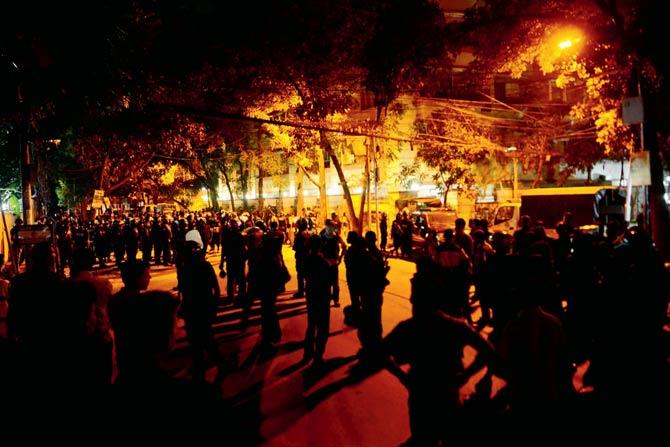Slowly and insidiously, through porous borders and the ether of the Internet, the Daesh is influencing young minds in India as it did elsewhere. And, their aim is to destroy India

 All signs point to a major terrorist strike in India within the next few months.
All signs point to a major terrorist strike in India within the next few months.
This is likely to happen despite our intelligence and security agencies frantically raising red flags across the country.
ADVERTISEMENT
Delhi, Mumbai and Goa have been put on alert after a Punjab police warning on July 7 that three terrorists from Pakistan, armed with sophisticated weapons and possibly a suicide belt, may have sneaked into India.
In the east, West Bengal, Assam and Meghalaya have ramped up security, following the July 1 massacre at a Dhaka café by affluent youngsters claiming allegiance to the Daesh, or Islamic State, followed by the bomb attack on the country’s largest Eid gathering on July 7.

Pictures of five men, allegedly the gunmen who carried out an attack in Bangladesh capital Dhaka on July 1, 2016 during which 20 hostages were slaughtered at the Holey Artisan Bakery cafe. In this, they are posing with rifles in front of a flag of the Islamic State jihadist group at an undisclosed location. Pics/AFP
Then there are reports that Asim Umar, the head of the Al Qaeda in the Indian subcontinent, or AQIS, has recently urged Indian Muslims to follow the example of lone wolves in Europe and kill senior IAS and IPS officers.
Also read: NIA warns of plot to blow up Bhayandar, Thane and Vashi bridges

Bangladeshi security personnel stand guard after ISIS terrorists stormed Holey Artisan Bakery cafe in Dhaka’s high-security diplomatic district early on July 2, 2016
In the last week of June, 11 young men said to be members of a Daesh affiliate were arrested in Hyderabad, and accused of planning massive city wide attacks.
While the flow of jihadis from Pakistan is a decades-old threat, the rise of the Daesh, and its clones in Bangladesh, is an ominous new development.
Even more disturbing are reports that two of the Dhaka café attackers, as well as some of the Daesh suspects arrested in Hyderabad, claim to be inspired by the sermons of Zakir Naik, a popular Mumbai-based Islamist preacher.
Forget ‘intelligence inputs’, the Daesh itself has made its intentions very clear.
According to Abu Ibrahim Al-Hanif, the newly appointed Emir of the Daesh in Bangladesh, “….having a strong jihad base in Bengal will facilitate performing guerrilla attacks inside India simultaneously from both sides and facilitate creating a condition of tawahhush (savagery causing fear and chaos) in India along with the help of the existing local mujahidin there.”
“It is not the methodology of the Khilafah’s [caliphate] soldiers to send more threats to the enemies of Allah,” he says in a long interview in the April issue of Dabiq, the rabid outfit’s slickly produced online magazine. ‘Rather, we let our actions do the talking. And, our soldiers are presently sharpening their knives to slaughter the atheists, the mockers of the Prophet, and every other apostate in the region, bi idnillah [by Allah’s will].”
Despite this, for political and economic reasons, Bangladesh has staunchly denied the presence of Daesh in the country, and continues to insist that the recent spate of attacks are the handiwork of the Opposition and domestic Islamic outfits.
The fact that Daesh appears to have co-opted the cadres of many of these local Bangladeshi outfits like the Jamaat-ul-Mujahideen Bangladesh (JMB), Jagrata Muslim Janata Bangladesh and the youth wing of the local
Al-Mujahideen, further complicates the threat perception in India.
The JMB, which wants Sharia law in Bangladesh, has a fairly large network in West Bengal, Jharkhand and Assam. And Hyderabad, with its young, tech savvy population, has been a rich hunting ground for the Daesh.
India has always boasted that despite having the second largest Muslim population in the world, estimated at 170 million, no Muslim from the country took part in the Jihad in Afghanistan, or joined the Al Qaeda.
As for the Islamic State, a tacit understanding with Turkey ensures that ‘misguided’ young Indians who arrive there in the hope of joining the Daesh in neighbouring Syria are quickly identified and sent back to India.
“At best, there are no more than 30 Indians who have actually joined the Islamic State in Syria,” an intelligence official told me recently. He, however, declined comment when asked about IS modules within India.
“The IS is known for its aggressive digital campaign,” said another senior counter-intelligence official. “Today, when almost every youngster in the country has access to a cellphone, it is very easy to reach out and subvert impressionable young minds through social media, as well as WhatsApp, Instagram, and a host of other such platforms.”
The situation is further compounded by venal Indian politicians who fear that arresting known Muslim radicals or hate mongers would disturb their vote banks. This, despite the fact that many senior leaders of the community have repeatedly denounced the Daesh and Al Qaeda as un-Islamic.
The long, porous border with Bangladesh, and the influx of illegal immigrants blatantly facilitated and encouraged by ruling political parties in West Bengal Tripura for padding up their voters’ lists, gives the Daesh easy access to India.
So, as we brace for the next terrorist strike, perhaps we should let the late Maloy Krishna Dhar, former joint director of the Intelligence Bureau and the author of several explosive books, have the last word.
“This is not a war by Muslims against Hindus,” he told me more than a decade ago. “It is a war against India by foreign-based jihadist forces headed by Pakistan, Bangladesh and International Islamist Inc. Every Indian —regardless of religion, ethnicity, caste, creed, or gender — is required to unitedly fight these enemies.”
—The author is foreign and strategic affairs analyst, and a Consultant Editor of Indian Defence Review
 Subscribe today by clicking the link and stay updated with the latest news!" Click here!
Subscribe today by clicking the link and stay updated with the latest news!" Click here!







